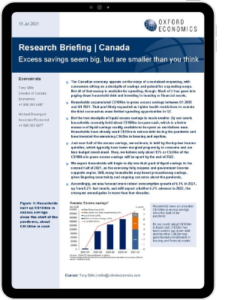Canada | Excess savings seem big, but are smaller than you think

Canadian Households accumulated C$184bn in gross excess savings between Q1 2020 and Q1 2021. That pool likely expanded as tighter health restrictions to contain the third coronavirus wave limited spending opportunities in Q2. But the true stockpile of liquid excess savings is much smaller.
What you will learn:
- A portion of the excess savings has already been used to pay down debt and invest. By our count, households currently hold about C$100bn in spare cash.
- Just over half of the excess savings, we estimate, is held by the top two income quintiles, which typically have lower marginal propensity to consume and are less budget constrained.
- We expect the release of pent-up demand, particularly for services restricted during the pandemic, will fuel a 14% average annualized surge in consumption in H2 2021, underpinning our forecast for 6.1% growth in personal expenditures this year before a similar 6.2% advance in 2022.
Tags:
Related Services

Post
Global Private equity real estate fund maturities spur asset sales
We expect the significant increases in fund maturities, spurred by capital raised over the past decade, to exert upward pressure on the rate of asset disposals as the funds approach the end of their lifecycles.
Find Out More
Post
Eurozone: Little sign of harm from the Red Sea disruptions
The impact of Red Sea shipping disruption on the eurozone economy continues to be limited, in line with our baseline view. Our new Eurozone Supply Stress Indicator suggests that supply pressures have returned to normal following a period of easing in 2023.
Find Out More